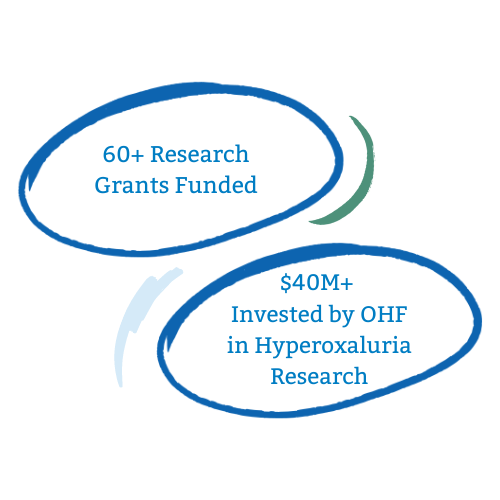Grants Funded
The Oxalosis and Hyperoxaluria Foundation (OHF) is proud to be the largest nonprofit provider of grants for hyperoxaluria research in the world. Since 1989, The OHF has raised and committed more than $40 million for hyperoxaluria research, and has funded over 60 grants. Our dedicated researchers and scientists are leading groundbreaking research all over the world to find better treatments for hyperoxaluria, and we will not stop until a cure is found for this disease. Visit our Grants & Funding page for more information.

| Luigina Romani, M.D. | Exploring the role of commensal bacterial and fungal communities and their metabolites in the handling of oxalate in primary and secondary hyperoxaluria |
| Laura Torella | Young Investigator Travel Grant |
| Todd Lowther, M.D. | Optimization of hydroxyproline dehydrogenase (HYPDH) inhibitors for the treatment of, PH2 and PH3 |
| Tanecia Mitchell, Ph.D., ASN Kidney CareTransition to Independence Grant | The Impact of Crystalluria on Immunity during Kidney Stone Formation |
| Nikhil Singh, Ph.D., ASN Kidney CareTransition to Independence Grant | Goal: Generate atlas of human oxalate nephropathy (16 patient samples): determine patterns of cell injury and how the immune system is involved. |
| Jonathan Whittamore, PH.D. | Oxalate transport bv the liver in Primary Hyperoxaluria type 1 |
| Ross Holmes, Ph.D. | “4-Hydroxy-2-oxoglutarate metabolism in PH3” |
| Jonathan Whittamore, PH.D. Nicola Bruneitti-Pierri, M.D. | Understanding the pathomechanisms underlying PH3 |
| Maria Garcia Bravo, PhD | Advanced Therapies for Treatment of PH1: Cellular Reprogramming and Gene Editing. |
| Yaacov Frishberg, MD | Stimulating Peroxismal Protein Transport as Treatment for Mistargeting Alanine Glyoxalate Aminotransferase Mutants Associated with PH1. |
| Dylan Dodd, M.D., Ph.D.ASN Kidney CareTransition to Independence Grant | Gut microbiota modulation of oxalate |
| Jonathan Whittamore, M.D. | The sulphate transporter SAT-1(SLC26a1) is essential for oxalate clearance from the liver in Primary Hyperoxaluria Type 1 |
| Michael Romero, Ph.D. | Understanding Oxalate Transport I flies and humans |
| Matthew Breeggemann, M.D. | Young Investigator Travel Grant |
| Maria Collazo-Clavell, MD | Mechanisms for hyperoxaluria and renal stone formation after bariatric surgery |
| Barbara Cellini, PhD | Development of a small-molecule therapy for PH1 based on the combined administration of B6 vitamers and pharmacological chaperones |
| Jaun Rodriguez-Madoz, PhD | Groundbreaking therapies and disease models for Primary Hyperoxaluria |
| Lama Nazal,M.D. , ASN Kidney CareTransition to Independence Grant | Oxalate Metabolism in a Humanized Mouse Model |
| Nicola Brunett, MD | Identification of TLR4 as a novel therapeutic target in progressive oxalate nephropathy |
| Felix Knauf, MD | Using mitochondrial protein import modulators to target mutant AGT from mitochondria to peroxisomes. |
| Carla Koehler, PhD | Using mitochondrial protein import modulators to target mutant AGT from mitochondria to peroxisomes. |
| W. Todd Lowther, PhD | Hydroxyproline dehydrogenase: a promising target to treat all forms of Primary Hyperoxaluria |
| Emmanuel richard, MD | ALEN-mediated gene correction for Primary Hyperoxaluria Type 1 therapies and disease models for Primary Hyperoxaluria |
| Gloria Gonzales, PhD | Groundbreaking gene therapy for sufferers of Primary Hyperoxaluria |
| Todd Lowther, PhD | Molecular studies of HOGA inactivity in PH3 and inhibition of glyoxylate reductase by 4-hydroxy-2-oxoglutarate |
| Monica Diaz-Gavlin PhD | New Glycolate Oxidase Inhibitors for the Treatment of Primary Hyperoxaluria |
| Michaell Conn, PhD | Development of HTS Assays for Drugs for Hyperoxaluria |
| Marguerite Hatch, PhD | Mechanistic basis of Probiotic Treatment in Primary Hyperoxaluria |
| Barbara Cellini, PhD | A combined biochemical and cell biology approach to improve the pharmacological treatment of PH1: from pyridoxine derivatives to proteostasis regulators |
Visit our Grants Funded Archive here to see all the the impactful grants that the OHF has supported over the past 30 years.